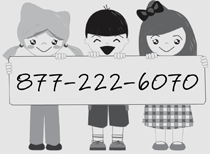| ChildCare Careers Newsletter - December 2017 | ||||||||||||

|
||||||||||||
|
"Happy Holidays!"
|
|||||||||||
| Jan. 17-19, 2018 |
Young Child Expo and Conference Los Angeles, CA www.youngchildexpo.com |
| Jan. 19-20, 2018 |
ACSI - Northern California Early Education Conference Fremont, CA www.acsi.org |
| Feb. 5-9, 2018 |
California Head Start Association Annual Conference Costa Mesa, CA www.caheadstart.org |

Making Family Connections
Early childhood professionals talk with parents about all kinds of things. Most often, these interactions revolve around enhancing their child's participation in the early childhood program. To foster true partnerships, a conscious effort to promote open communication is key. When parents have a child with a disability, effective communication is especially critical. Whether it is a note, a parent conference, or an informal conversation at the end of the day, every interaction should be:
- Timely - Whether it is good news, a regular update, or a bad situation getting worse, communicate with parents often and regularly. Share both exciting and difficult news at the first opportunity. When parents see you as open and approachable, they will more likely share information with you in a timely manner as well.
- Reciprocal - Expect to learn as much as you share as you communicate with parents. This means listen at least as much as you speak (and maybe more). Avoid approaching parents about an issue with the solution already clearly defined in your mind. Leave room in your problem-solving for parent feedback and suggestions. Make certain that both your actions and words reflect your goal to form a partnership with them.
- Constructive - The purpose of parent/provider partnerships is to provide one another with valuable information, insights, and knowledge about the child. This is best achieved by offering suggestions, asking for feedback, and joint decision-making. As a professional, you should avoid venting, criticizing, or patronizing parents.
- Honest - Tell parents what you really mean because you want them to tell you what they really mean. If you do not know how to position their child so he can easily play with toys in the water table, be honest enough to say so. It may seem easier to talk around an issue, but a direct approach is more likely to lead to positive outcomes.
- Respectful - Be slow to judge and quick to give parents the benefit of the doubt. Let families know you respect their privacy and their opinions. Be especially sensitive about cultural, language, and social differences. Let parents find in you an attentive partner in the care and education of their child.
- Confidential - As you develop trusting relationships with parents, you may be told or given information that they do not share with everyone. A child’s diagnosis, medications, therapies, educational goals, or what is happening at home right now are examples of information you should keep confidential. Whenever you describe a child to someone other than the child’s parent(s), confidentiality is jeopardized. While it is natural to want to share events of the day, a child’s progress, or concerns you have, being a professional requires you to maintain confidentiality and guard each family’s right to privacy.
When you follow these guidelines in your interactions with parents, you strengthen the bonds of partnership: respect, appreciation, and trust. Strong parent partnerships are the cornerstone of quality care and education for all of the children in your program.
*Reference: CCPlus www.ccplus.org

Call us anytime at 877-222-6070.



